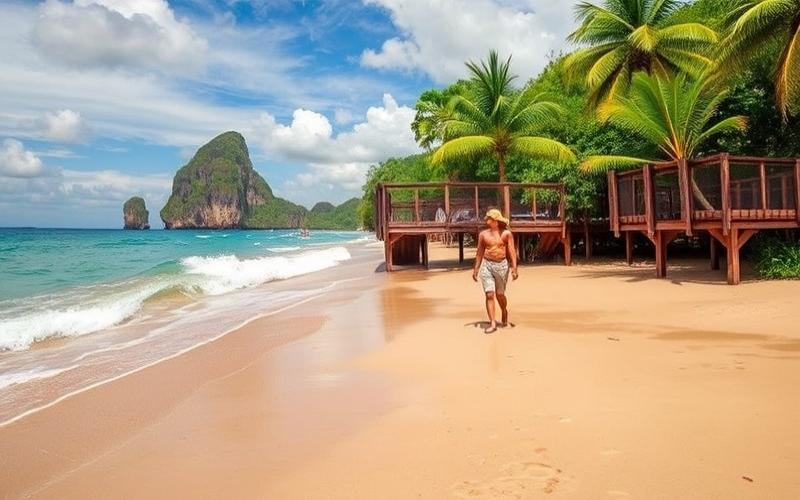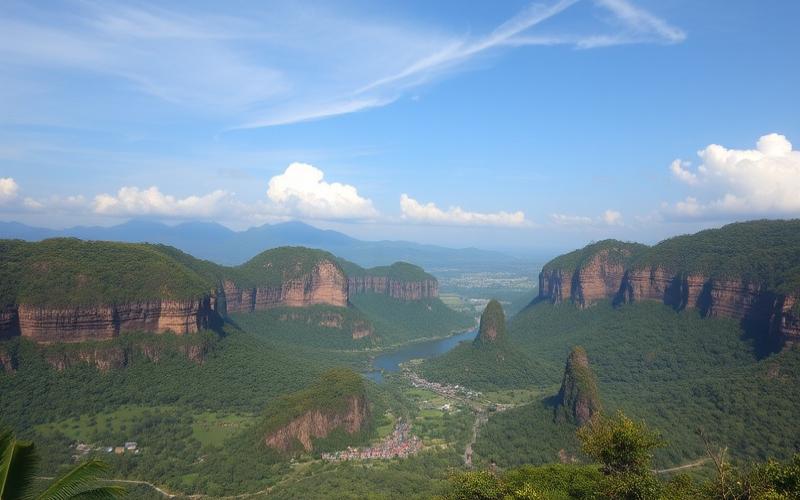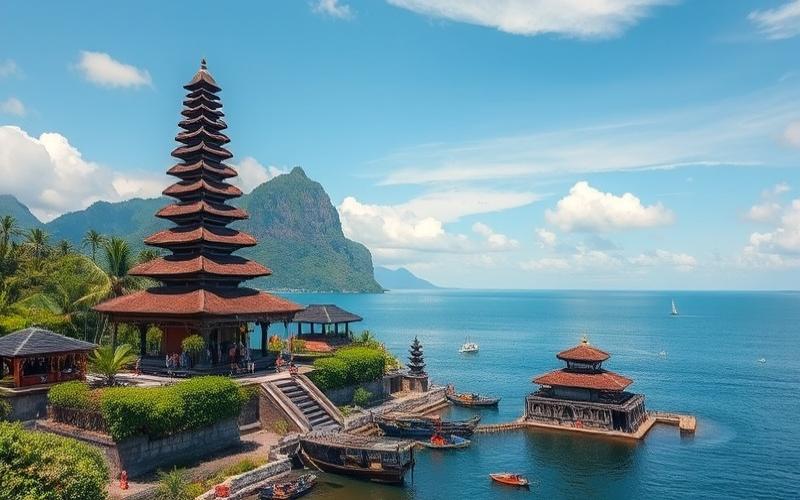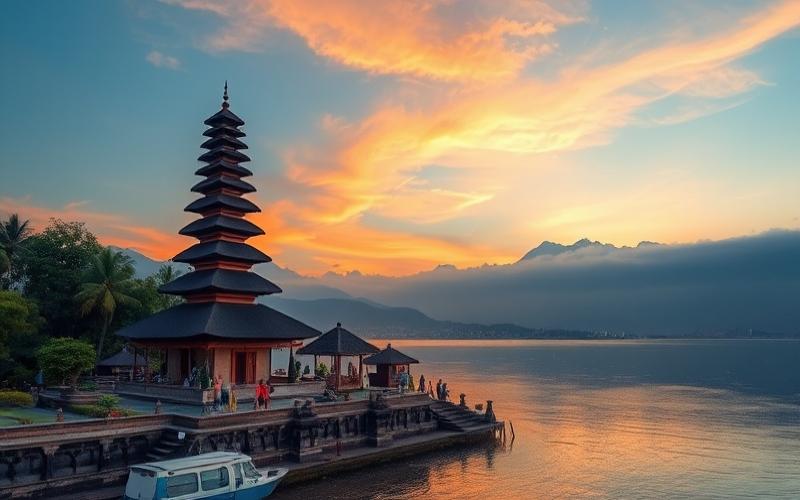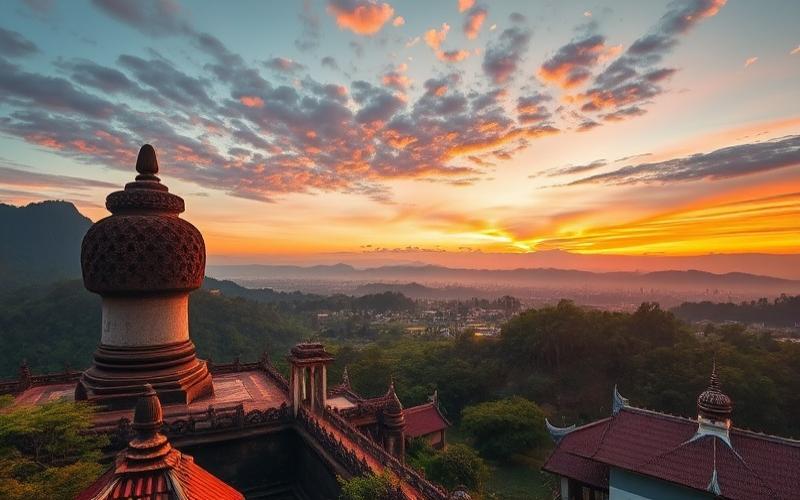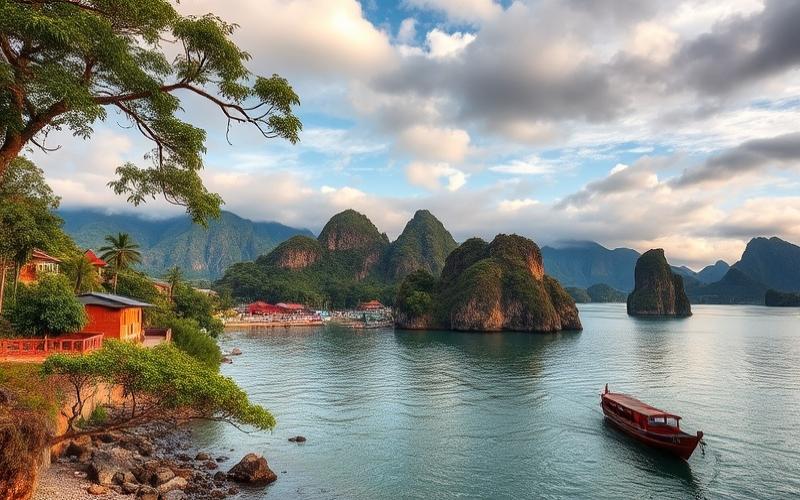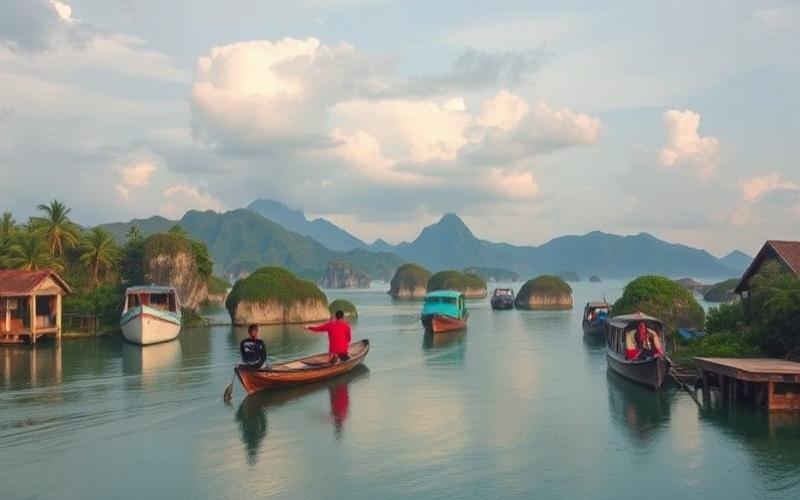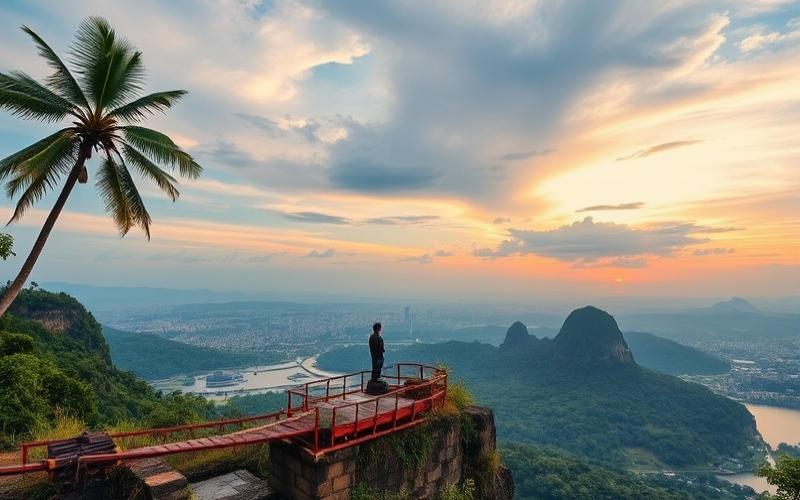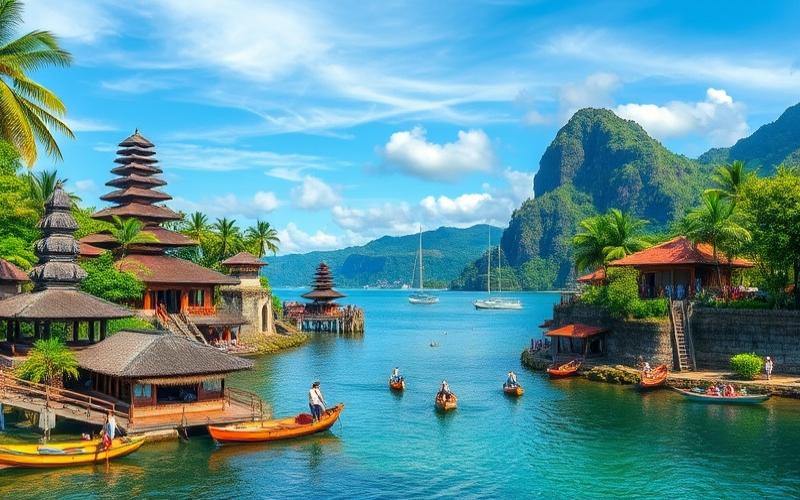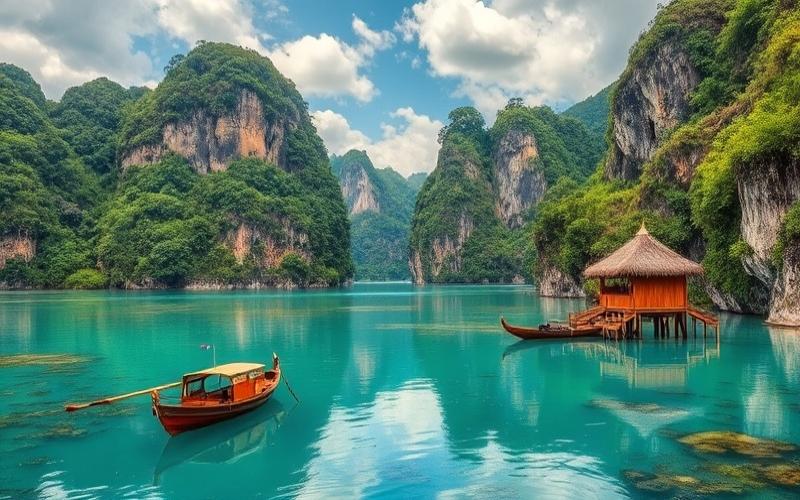
 Published on and written by Cyril Jarnias
Published on and written by Cyril Jarnias
Living in Indonesia can be a rewarding adventure, but it requires genuine adaptability to the various climate challenges presented by this fascinating country.
With its paradise islands, equatorial tropical climate, and abundant wildlife, Indonesia is as captivating as it is complex for unprepared expatriates.
Intense heat, high humidity, heavy monsoons, and seismic risks are part of daily life, and knowing how to adjust your lifestyle habits is essential to fully acclimate.
Through this article, we will reveal practical tips and smart advice to transform climate peculiarities into genuine opportunities for personal and professional fulfillment.
How to Adapt to the Indonesian Climate? Our Exclusive Tips!
The Indonesian climate is marked by alternating dry season and rainy season, with notable impacts on daily life, activities, and expatriate organization.
| Season | Main Months | Key Characteristics |
|---|---|---|
| Dry Season | April/May to October/November | Sunny days, little rain, stable temperatures (25-33°C), lower humidity |
| Rainy Season | November to March/April | Frequent showers, high humidity levels (up to 90%), constant temperatures but increased heat sensation |
Impacts on Daily Life and Outdoor Activities:
- Dry Season: Ideal for outdoor activities (hiking, diving, walks, tourism), more passable roads, more frequent outdoor cultural events.
- Rainy Season: Risk of floods, sometimes impassable roads, limited outdoor activities especially in the afternoon (frequent showers), need to adapt to weather-related interruptions.
Influence on Wardrobe and Health:
Recommended Clothing:
- Dry Season: Light, breathable clothing, hats, sunglasses, sunscreen.
- Rainy Season: Waterproof clothing, rain-appropriate shoes, change of clothes, umbrella.
Health:
- Drink plenty of water to avoid dehydration.
- Prefer cotton clothing to limit heat and humidity-related irritation.
- Protect yourself from mosquitoes (risks of dengue, malaria in certain regions).
- Take precautions against heatstroke during dry season.
Managing Heat and Humidity:
Practical Tips:
- Avoid intense physical activities during the hottest hours (noon-4pm).
- Use fans or air conditioning, ventilate homes early morning or late evening.
- Prefer non-alcoholic cold drinks and water-rich fruits (watermelon, mango).
- Equip yourself with appropriate sun protection even under cloudy skies.
Protecting Homes from Rain and Floods:
- Elevate water-sensitive belongings.
- Check roof and window waterproofing before rainy season.
- Install drainage systems around the house.
- Prepare flashlights and water reserves in case of power outages.
Regional Microclimates and Expatriate Adaptation:
Indonesia has strong regional variations: Java and Bali have fairly distinct seasons, Sumatra and Borneo are more humid, the Moluccas and Papua have different patterns.
Mountain areas are cooler, sometimes with very cool nights or even snow at high altitudes.
Expatriates are advised to research the local climate of their host region and adapt their equipment (for example, prepare warmer clothing for high-altitude areas).
Expatriate Anecdotes and Tips:
- Many expatriates recommend always carrying a raincoat or umbrella in your bag, even during dry season.
- Some advise planning trips in the morning, as showers often fall in late afternoon.
- Many adapt their lifestyle rhythm to the weather: waking earlier, afternoon naps, dining on terraces in the evening when temperatures drop.
- For humidity, using dehumidifiers or silica gel packets in closets helps protect clothing and electronic devices.
Summary of Practical Tips for Expatriates:
- Research the local climate before moving.
- Adapt your wardrobe and habits to the season.
- Prepare your home against bad weather.
- Adopt a flexible routine based on showers and heat.
- Always keep in mind the importance of hydration and sun protection.
Adapting to the Indonesian climate means accepting to modify your lifestyle rhythm, prioritizing flexibility and prevention, and fully enjoying the archipelago’s natural and cultural riches.
Good to Know:
In Indonesia, the dry season extends from May to September, ideal for outdoor activities, while the rainy season, from October to April, requires waterproof clothing and precautions against humidity; expatriates emphasize the importance of knowing local microclimates to better manage temperatures and anticipate floods.
Measuring Climate Impact on Health and Daily Life
Indonesia has a tropical climate characterized by stable temperatures throughout the year, generally hovering around 28°C on the coasts, 26°C in inland regions, and 23°C at altitude. The country experiences only two distinct seasons that rhythm expatriates’ daily lives and directly influence their health and well-being.
The dry season, extending from May to October, offers more comfortable conditions with reduced rainfall and slightly decreased relative humidity. Clear skies and regular trade winds alleviate the heat sensation. Conversely, the wet season, from November to April, is characterized by significant rainfall and humidity levels reaching 75 to 90%, with storms generally concentrated in late afternoon. Temperatures remain relatively stable, but ambient humidity significantly intensifies the heat sensation.
These climate variations directly impact expatriates’ health. High humidity promotes the proliferation of mosquitoes carrying tropical diseases, particularly dengue, whose transmission intensifies during the wet season. Hot and humid conditions can also exacerbate existing respiratory problems and trigger allergic reactions in sensitive individuals. Constant heat, combined with humidity, significantly increases risks of dehydration and heatstroke, especially for those unaccustomed to tropical climates.
Essential Health Precautions
Preventing mosquito bites is an absolute priority. Daily use of repellents containing DEET, wearing long, light-colored clothing in the evening, and installing impregnated mosquito nets in homes significantly reduce risks. Expatriates must eliminate any stagnant water sources around their homes, as mosquitoes reproduce rapidly during the rainy season.
Hydration represents a constant challenge in this tropical climate. Drinking at least 2 to 3 liters of water daily is recommended, even without feeling thirsty, as constant sweating leads to significant fluid loss. Electrolyte drinks may be necessary during intense physical activities or prolonged heat exposure.
Regarding vaccinations, several are recommended before settling in Indonesia: hepatitis A and B, typhoid, Japanese encephalitis for extended rural stays, and updating universal vaccines like tetanus and polio. Antimalarial treatment may be prescribed for specific rural areas.
Clothing and Daily Adaptations
Clothing choice plays a crucial role in climate adaptation. Light, breathable, light-colored fabrics in natural fibers like cotton or linen allow better sweat evaporation. Even during dry season, a light waterproof garment remains essential as showers can occur in the evening.
Home arrangement requires special attention. Air conditioning often becomes indispensable, not only for comfort but also to preserve health, regulate indoor humidity, and prevent mold development. A dehumidifier effectively complements this setup during the wet season. Space ventilation must be optimal to avoid humidity accumulation conducive to respiratory problems.
Work schedules and daily activities should be reorganized according to the climate. It’s preferable to avoid intense physical efforts between 11am and 3pm, when sunlight and heat peak. Indonesians themselves often adopt a slower pace during these hours, favoring indoor activities or extended breaks.
Mental Adaptation Strategies
Psychological adaptation to tropical climate constitutes an often underestimated aspect. Constant heat and humidity, absence of marked seasonal variations, and lack of natural light during the rainy season can affect morale and cause a form of climate fatigue.
Maintaining a structured routine helps compensate for the absence of seasonal markers. Regular physical exercise, practiced during cool hours (early morning or evening), promotes physiological adaptation and maintains mental well-being. Water activities like swimming offer an excellent compromise between exercise and refreshment.
Creating comfortable, air-conditioned indoor spaces to recharge becomes essential. These refuges allow managing heat-related fatigue moments and maintaining psychological balance. Some expatriates find it beneficial to plan escapes to mountainous regions, where cooler temperatures offer a welcome respite.
Gradual acceptance of the tropical rhythm, rather than resistance, greatly facilitates adaptation. Adopting a flexible approach to time and productivity, in harmony with climate conditions, reduces stress and improves quality of life. Periods of intense heat or heavy rain can be transformed into opportunities for slowing down and contemplation, rather than sources of frustration.
Good to Know:
In Indonesia, it’s crucial to prepare for the rainy season by using light and waterproof clothing, while taking precautions against mosquitoes to avoid dengue, such as wearing long clothing and using repellents. During the hot and dry season, adjust your schedule to avoid the hottest hours, stay well hydrated to prevent heatstroke, and consider air conditioning your home for optimal daily comfort.
Strategies for Acclimating Serenely
To successfully acclimate in Indonesia, it’s essential to combine preparation, open-mindedness, and adaptability. Here are practical strategies for settling serenely in the archipelago.
Respecting Local Customs and Traditions
Indonesia is a country deeply rooted in its traditions and cultural diversity. Taking time to observe, listen, and respect local customs greatly facilitates integration. For example, greeting with a smile, using the right hand to give or receive objects, removing shoes before entering a house or temple are appreciated gestures. Participating in village ceremonies (when invited) also helps build community ties.
Learning Some Basic Bahasa Indonesia
Even basic mastery of the local language radically changes daily life: it shows respect towards hosts and simplifies exchanges at the market, at the doctor’s, or with neighbors. Here are some resources to start:
- Mobile Applications: Duolingo, Babbel
- In-Person Classes: Jakarta Language Academy, Cinta Bahasa in Bali
- Facebook Groups dedicated to expatriates for practice and exchange
| Resource | Type | Main Advantage |
|---|---|---|
| Duolingo/Babbel | Application | Flexible learning |
| Jakarta Language Academy | In-person classes | Language immersion |
| Facebook Groups | Community | Informal practice |
Getting Used to Local Food While Preserving Well-being
Indonesian cuisine is rich but sometimes spicy. It’s advisable to gradually discover traditional dishes (nasi goreng, satay, gado-gado), while identifying ingredients that suit your system. For those with specific diets or allergies:
- Prefer restaurants frequented by expatriates initially.
- Ask for “tidak pedas” (not spicy) if needed.
- Cook yourself with fresh local products.
- Drink plenty of bottled mineral water.
Managing Equatorial Climate Heat and Humidity
The tropical climate can be taxing; here’s how to adapt:
- Wear light clothing in cotton or linen.
- Avoid intense physical activities midday.
- Stay hydrated regularly.
- Use fans or air conditioning moderately to avoid thermal shock.
- Adapt your daily rhythm: prefer early morning or late afternoon for outings.
Creating a Local Social Network
Integration also comes through social life:
- Participate in community events (local markets, religious festivals).
- Join Facebook groups dedicated to expatriates (“Expats in Jakarta”, “Bali Expats”).
- Register with Internations Jakarta/UFE Indonesia/Femmexpat to meet other French speakers.
- Volunteering locally can also help build authentic connections.
Solidarity among expatriates is real; don’t hesitate to ask for advice around you!
Traveling Within the Country
To better understand Indonesia and feel at home:
- Exploring different islands (Java, Bali, Sulawesi…) allows appreciating the country’s cultural and geographical diversity.
- Visiting museums, temples, natural sites helps grasp the country’s complex history and heritage richness.
In summary, successful acclimation relies on a proactive approach: respect, courtesy, learning ability, smart networking, and traveling curiosity. Be patient with yourself; every small step counts toward harmonious settlement!
Good to Know:
To acclimate in Indonesia, learn some basic words in Bahasa Indonesia and respect local customs; to manage heat, prefer light clothing and adjust your lifestyle rhythm.
Equipment and Adaptations Suited to Local Conditions
Adapting to the Indonesian tropical climate requires meticulous preparation both for personal equipment and home arrangement. The country experiences temperatures ranging from 22° to 34°C throughout the year, with constant humidity demanding specific solutions.
Clothing and Personal Equipment
Breathable clothing forms the basis of an adapted wardrobe. Cotton and linen prove particularly effective against heat and humidity. Light t-shirts, loose pants, and flowing dresses allow optimal air circulation while respecting local decency norms. It’s advisable to prefer outfits covering shoulders and knees, especially in rural areas and during religious site visits, Indonesia being predominantly Muslim.
To protect from intense sun, a hat, sunglasses, and sunscreen are essential. A versatile sarong or scarf proves valuable, serving both as additional clothing protection for temples and as light cover in air-conditioned transport.
The rainy season, extending from November to March with particularly heavy rainfall in January and February, requires having a quality waterproof jacket or light, compact poncho. Tropical showers frequently occur in the afternoon, and a sturdy umbrella effectively complements rain equipment. Quick-dry clothing and waterproof pouches to protect electronic devices then become essential.
For mountainous regions like Ubud or Java’s highlands, where temperatures drop significantly at night, warmer clothing layers are necessary. This precaution also applies to air-conditioned transport and public establishments where air conditioning often reaches freezing temperatures.
Living Space Arrangement
Tropical Indonesian housing requires special attention to air circulation. Natural ventilation systems, combined with ceiling fans or standing fans, create constant airflow that reduces humidity sensation. Air conditioning, although common in urban areas and tourist establishments, should be used moderately to avoid thermal shock and limit energy consumption.
Choosing humidity-resistant materials proves crucial. Bamboo, teak, and other treated tropical woods offer excellent durability against humid conditions. These local materials possess natural resistance properties to mold and degradation. Stone or tiled floors facilitate maintenance and indoor coolness.
Light furniture promotes flexible space reorganization according to ventilation needs. Minimalist rooms with sparse furniture allow better air circulation and simplify regular cleaning necessary in humid environments. Upholstery textiles should be chosen in breathable materials, easily washable and humidity-resistant.
Mosquito Protection
Mosquito nets represent the first line of defense against disease-carrying insects. Installed on windows and around beds, they guarantee peaceful nights without exposure to bites. In some areas, antimalarial treatment may be recommended depending on visited regions.
Mosquito repellents in spray form constitute an indispensable complement, to apply regularly on exposed skin areas. Local practices also include using mosquito coils and electric devices diffusing insecticides, particularly effective indoors during peak mosquito activity hours, at dusk and dawn.
Eliminating stagnant water points around the habitat significantly reduces mosquito proliferation. Containers, gutters, and poorly drained areas must be monitored and maintained regularly.
Rainy Season Management
An effective drainage system around the residence prevents infiltration and water accumulation. Properly sized gutters, adequate land slopes, and functional drains direct rainwater away from foundations. Regular inspection and maintenance of these installations before and during the wet season avoid flooding problems.
Roofs should be checked to guarantee waterproofing, with particular attention to junction areas and fixation points. Traditional Indonesian roofing materials, adapted to heavy rainfall, generally offer reliable protection if properly maintained.
Indoors, preventing excessive humidity involves constant ventilation and potential use of dehumidifiers in most exposed rooms. Storing belongings in airtight containers protects against mold, particularly problematic during rainiest months.
Good to Know:
Opt for light cotton clothing that allows skin to breathe and ensure your home is equipped with fans or air conditioning to counter humidity; mosquito nets are essential to protect against mosquitoes, as are repellents, especially during the rainy season where sturdy umbrellas and a good drainage system around the house are important.
Disclaimer: The information provided on this website is for informational purposes only and does not constitute financial, legal, or professional advice. We encourage you to consult qualified experts before making any investment, real estate, or expatriation decisions. Although we strive to maintain up-to-date and accurate information, we do not guarantee the completeness, accuracy, or timeliness of the proposed content. As investment and expatriation involve risks, we disclaim any liability for potential losses or damages arising from the use of this site. Your use of this site confirms your acceptance of these terms and your understanding of the associated risks.





